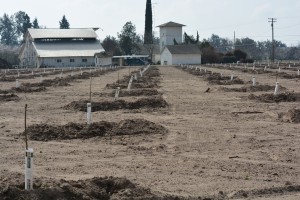
In the 150 years or so since the Valley has been settled, the farming community has converted a vast grassland steppe filled with birds, elk, and other wildlife into one of the world’s greatest food producing regions. Natural resources have been utilized to the fullest―possibly to an extent greater than the land’s carrying capacity.
Faced with a water shortage of increasing intensity, anti-farming interests want to alter farming practices and take large swaths of land out of production, maintaining that the industry is not sustainable in its present form.
But making farming more sustainable has not been a goal of urban interests, which seek to take water from farms to promote non-farm development. Developing new water sources so that the Valley has plenty for all interests has not been a priority.
Sustaining Farming in the Great Valley
Farmers in the Great Valley produce about twenty five percent of the nation’s food supply. The nation’s food security is highly dependent upon keeping the Valley’s farming industry healthy. If farming were to cease in the Valley, food prices and imports would skyrocket and make our nation dependent upon food production in other countries.
Our national security could be threatened by the cut off of imports or the unilateral decision of other countries not to sell us food. This is a real concern in our politically unstable world. Rapidly changing politics can quickly turn surplus to shortage. So can unpredictable weather events that periodically wipe out entire crops in various regions around the world.
In recent years, we have seen the results of crop failure in the local supermarkets, where some items spike to double in price in a short period of time or become completely unavailable. The missing items may not be noticed because we have so much choice. But over time, the reduction in selection will become more evident as world population continues to grow and crop failures have greater adverse impacts.
The high productivity of the Great Valley has kept supermarket shelves full in the United States. We haven’t suffered shortages to the extent that many other countries have. We usually have plenty of fresh fruits and vegetables all year.
Water Use
During the drought, critics of the farming industry complain that too much water is used for food production. As food is necessary to sustain life, such criticism is unrealistic.
Farmers use the amount of water needed to raise crops while keeping the soil fertile. Flood irrigation recharges ground water and removes salts that hinder growth.
Farmers are always looking for better, more efficient methods of farming. If they can save money and use less water, good businessmen do so. While not all farmers use the best practices, those who are the most efficient have the more profitable farms. Those who don’t keep up with improving technology eventually go out of business.
Over time, crops production has increased while water use for that same production has decreased. From 1980 to 2000 alone, 38 California crops improved production (tons/acre foot of water) by an average of 38 percent. Today, farmers continue to become more efficient with water use.
Subsidized Water
During the drought, those outside of the farming industry are becoming more vocal about subsidized water rates for businesses that produce our food. Rather than argue about whether farmers should receive water at subsidized rates, the real issue should be whether subsidies can be justified.
From an economics standpoint, the greater the subsidy, the less incentive exists to use water efficiently. However, any reduced incentive to use less water is offset by the benefits of keeping soil fertile and recharging the ground water supply. The benefits of flood irrigation are only visible over long periods of farming; one huge benefit is recharge of underground aquifers.
When a farmer uses more water than he immediately needs, the water soaks into the ground, evaporates, or ends up in the river. All water that farmers use gets recycled by nature. Overuse of water by farmers does not result in a total loss of the excess water used.
In urban areas, the story is different. The more water that is used, the more polluted water has to be processed in special water treatment plants to remove toxins from the water. Except for lawn watering that does not end up in storm drains, water used in urban areas is removed from the ground water basin and does not have the opportunity to soak into the ground to recharge the ground water supply.
If we factor in the social cost of water use in urban areas versus the social benefit of water use in farming areas, a reasonable person may conclude that the so-called subsidies in water rates that farmers appear to receive can be fully justified in the benefits of food production to society and recharge of groundwater.
Can the Farming Community Do Better?
The farming community can do a better job of farming in a manner that is less harmful to the environment. The industry is constantly looking for ways to do better and has been gradually improving over time. We should encourage improvement rather than look to alternatives that harm farming as a business.
Wise public policy is to keep farming as a business profitable and sustainable, while constantly striving for improvement. The leaders in the farming industry have priorities that are consistent with the public interest. What is of great concern is that those outside of the industry don’t understand farming as a business and may implement policies that are contrary to the public interest.
Advocates for farming need to educate the general public so that everyone understands what water policies are in the public interest and why.
